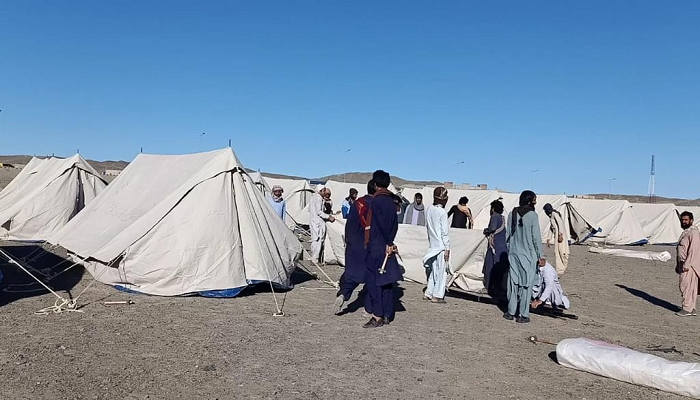'Held like prisoners at Taftan': Pilgrims recount time at quarantine camp
Dealing with a large influx of pilgrims has overwhelmed the government of the poorest province in Pakistan
March 21, 2020

QUETTA: The number of confirmed coronavirus cases in Balochistan has risen to 96, as health workers and officials in the province struggle to deal with the deadly outbreak.
In Quetta alone, 56 people tested positive in a single day on March 19. The patients were first kept in isolation at the Taftan border, between Balochistan and Iran, and then shifted to the quarantine center in Mian Ghundi in southwest Quetta.
Nearly all those who have been infected recently arrived from Iran, via the border crossing. Those who were residents of Balochistan have been kept back, while the others were sent off to their hometowns in other provinces.
Also read: Coronavirus outbreak: Government not imposing lockdown, says PM Imran
Directing pilgrims back to their cities has invited sharp criticism from other provinces, where officials insist that the men, women and children should have been tested and screened properly for the virus at the border.
But the reality is that dealing with a large influx of pilgrims overwhelmed the government of the poorest province in Pakistan, whose healthcare system, due to years of neglect, has remained under-resourced and understaffed.
Since last month, when the pandemic was first reported in Iran, 6,810 Pakistani pilgrims crossed the Pak-Iran border. As per the data of Balochistan’s health department, these people, after being kept at the border camps briefly, were sent to their hometowns on February 28.
At the moment, 422 people are still isolated at Taftan, a majority of whom belong to Quetta.
Doctors and medical staff who have visited the camp on the border paint a grim picture. “Some patients have cardiac problems, others have diabetes,” a doctor told Geo News on the condition of anonymity, “Yet, everyone is being held like prisoners.”
Eye-witnesses further detail the appalling conditions in which patients are being kept. “We are all being housed together in a large hall of an official building, known as the ‘Pakistan House Taftan’,” said Akbar Ali, a pilgrim who has just returned from Iran, “The center is hot, dusty and without basic facilities.”
Also read: US announces $1m fund for Pakistan to fight coronavirus
Last week, the shortage of doctors and other medical staff forced people to protest outside their camps.
In a recent press briefing, Sindh’s minister for education and labor slammed the Balochistan’s administration for poor arrangements at the border.
Responding to the allegation, Jam Kamal Khan, the chief minister of Balochistan, said in a tweet that his government was accommodating, medically assisting and facilitating all those arriving into the province, without help from other provinces.
“Did you send a single person to see your own people or send assistance,” he had tweeted.









